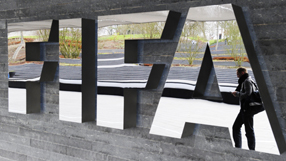FIFA ban six officials for life over friendlies
ZURICH - Six match officials have been banned for life over match-fixing in two friendly internationals last February that produced a total of seven penalties, FIFA said Wednesday.

The officials, three from Bosnia and three from Hungary, were involved in the Latvia-Bolivia and Bulgaria-Estonia matches played in the Turkish resort of Antalya on February 9.
Latvia won 2-1 and the other game ended 2-2, all the goals coming from penalties including one in the first match which was taken twice.
FIFA named the banned match officials as Sinisa Zrnic, Kenan Bajramovic and Rizah Ridalovic of Bosnia and Kolos Lengyel, Janos Csak and Krisztian Selmeczi of Hungary.
"The officials were found guilty of breaching article 62 paragraph 2 [passive corruption] and article 69 paragraph 1 [unlawfully influencing match results] of the FIFA disciplinary code," said football's governing body in a statement.
The Hungarian football federation had already banned their country's trio for their handling of the Bulgaria-Estonia game.
Hungarian referees' chief Laszlo Wagner said at the time: "I'm shocked because we didn't receive a letter to allow these referees to officiate at this game."
The four teams involved complained at the time about the refereeing, Bolivia coach Gustavo Quinteros saying that all three penalties were "invented" and describing the refereeing as a disgrace.
Get FourFourTwo Newsletter
The best features, fun and footballing quizzes, straight to your inbox every week.
Following the matches, FIFA tightened the rules over friendlies, which until then have been a free-for-all with no control from football's governing body.
FIFA said it would have to be informed who was refereeing each match and that it would intervene in the future if it saw anything suspicious.
Both FIFA and European football's governing body UEFA are alarmed about match-fixing which they say is organised by illegal gambling rings.
Turkey, Greece and Italy have all been hit by match-fixing scandals in the last few weeks and FIFA has said it will investigate Nigeria's 4-1 friendly win over Argentina in June which featured two controversial penalties, one for each side.
FIFA and UEFA have said that match-fixers prefer to target low-profile matches which are not televised and receive little publicity.
Lisle Austin has been banned from all football-related activity for one year by FIFA for taking his case to a civil court over CONCACAF's decision to oust him as acting president.
The Barbadian was in charge of the North, Central and Caribbean football confederation for four days following the suspension of its long-standing president Jack Warner in May over corruption allegations.
FIFA said on Wednesday that Austin had been banned by its disciplinary committee "for lodging a claim related to football matters in front of the ordinary courts in the Bahamas, constituting a breach of... the FIFA statutes."
Football's world governing body added that Austin must withdraw his case before he can be reinstated.
"Should Lisle Austin not withdraw the claim lodged in front of the ordinary courts in the Bahamas definitively and irrevocably, he will remain banned from taking part in any kind of football-related activity at national and international level... for as long as the legal proceedings in ordinary courts are pursued," said a FIFA statement.
Warner, who also sat on the FIFA Executive Committee, was suspended after allegations of bribery and pending further investigations by the world governing body's ethics committee.
Warner later resigned, the investigation against him was dropped and he was presumed innocent.
Austin, who as CONCACAF's most senior vice-president had replaced Warner, was in charge for just four days during which he tried to fire general secretary Chuck Blazer.
Austin also announced that he was conducting a 'forensic audit' of the regional body's accounts over the past five years.
The
